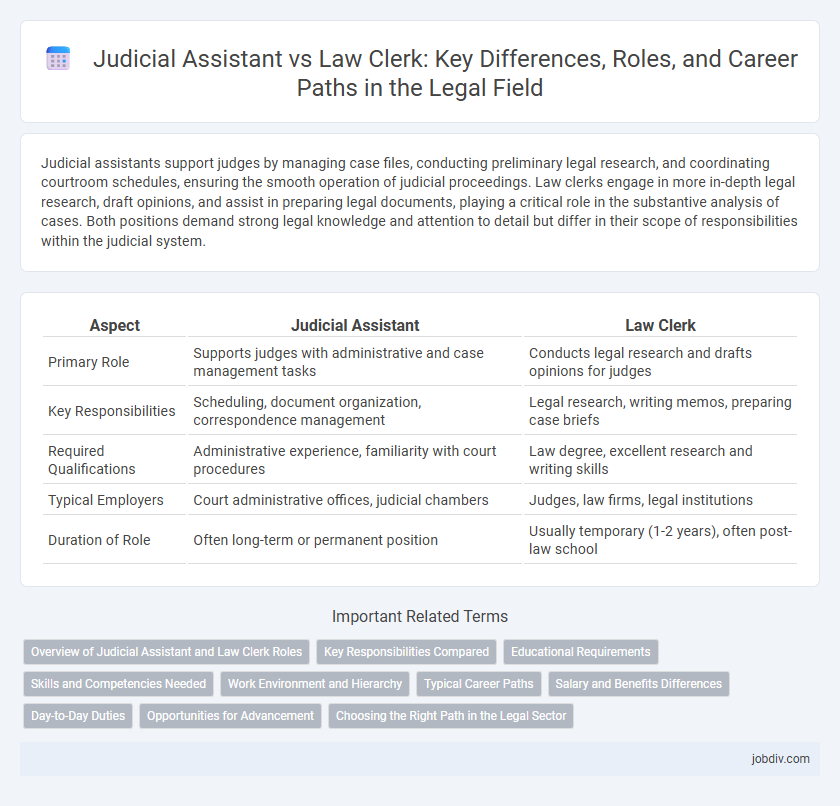Judicial assistants support judges by managing case files, conducting preliminary legal research, and coordinating courtroom schedules, ensuring the smooth operation of judicial proceedings. Law clerks engage in more in-depth legal research, draft opinions, and assist in preparing legal documents, playing a critical role in the substantive analysis of cases. Both positions demand strong legal knowledge and attention to detail but differ in their scope of responsibilities within the judicial system.
Table of Comparison
| Aspect | Judicial Assistant | Law Clerk |
|---|---|---|
| Primary Role | Supports judges with administrative and case management tasks | Conducts legal research and drafts opinions for judges |
| Key Responsibilities | Scheduling, document organization, correspondence management | Legal research, writing memos, preparing case briefs |
| Required Qualifications | Administrative experience, familiarity with court procedures | Law degree, excellent research and writing skills |
| Typical Employers | Court administrative offices, judicial chambers | Judges, law firms, legal institutions |
| Duration of Role | Often long-term or permanent position | Usually temporary (1-2 years), often post-law school |
Overview of Judicial Assistant and Law Clerk Roles
Judicial assistants support judges by managing case files, drafting legal documents, and coordinating court schedules, ensuring efficient court operations. Law clerks conduct in-depth legal research, prepare memoranda, and assist judges with opinion writing to support informed judicial decisions. Both roles require strong legal expertise but differ in responsibilities, with judicial assistants focusing on administrative tasks and law clerks on substantive legal analysis.
Key Responsibilities Compared
Judicial assistants primarily manage administrative tasks, including scheduling hearings, drafting legal documents, and coordinating court proceedings, enabling judges to operate efficiently. Law clerks conduct in-depth legal research, analyze case law, prepare bench memoranda, and assist judges with opinion drafting to support judicial decision-making. Both roles are essential in the judicial system but differ in their focus on administrative support versus substantive legal analysis.
Educational Requirements
Judicial assistants typically require a bachelor's degree in legal studies or a related field, emphasizing practical knowledge of court procedures. Law clerks often hold a Juris Doctor (JD) or are law students enrolled in accredited law schools, focusing on legal research and writing skills. The educational path for law clerks is more specialized and rigorous, preparing them for advanced legal analysis and case preparation.
Skills and Competencies Needed
Judicial assistants require strong organizational skills, legal research proficiency, and the ability to manage court schedules efficiently, while law clerks focus on advanced legal analysis, drafting opinions, and synthesizing case law. Both roles demand excellent written and verbal communication skills, attention to detail, and a thorough understanding of legal procedures. Proficiency in legal databases, critical thinking, and confidentiality are essential competencies for success in either position.
Work Environment and Hierarchy
Judicial assistants typically operate within the judge's chambers, providing administrative support and managing case files, while law clerks conduct in-depth legal research and draft opinions, often in a more academically focused environment. Law clerks usually hold entry-level or fellowship positions under the direct supervision of judges, positioned higher in the legal hierarchy due to their analytical responsibilities compared to judicial assistants who handle clerical tasks. The hierarchical distinction reflects the divergence in job functions, with law clerks contributing substantively to judicial decision-making and judicial assistants ensuring operational efficiency within the court system.
Typical Career Paths
Judicial assistants often begin their careers as paralegals or legal secretaries, gradually advancing within court administration or pursuing law school for judicial roles. Law clerks typically start as recent law graduates, gaining direct experience by researching case law and assisting judges, which can lead to positions as attorneys, judicial clerks, or law professors. Both roles provide critical exposure to legal processes but diverge in long-term career trajectories with judicial assistants leaning towards administrative or support roles and law clerks pursuing legal practice or academia.
Salary and Benefits Differences
Judicial Assistants typically earn higher salaries than Law Clerks due to their more extensive responsibilities and longer tenure within the judicial system. Law Clerks often receive limited benefits, commonly restricted to stipends or temporary health coverage, whereas Judicial Assistants usually qualify for full-time employee benefits such as health insurance, retirement plans, and paid leave. Salary ranges for Judicial Assistants vary from $50,000 to $80,000 annually, while Law Clerks generally earn between $40,000 and $60,000, reflecting the disparity in job permanence and professional duties.
Day-to-Day Duties
Judicial assistants primarily manage courtroom schedules, organize case files, and coordinate communication between judges and legal parties. Law clerks focus on researching legal precedents, drafting judicial opinions, and preparing case summaries to support judges' decision-making. Both roles require strong legal knowledge but differ in administrative versus analytical responsibilities within the judicial system.
Opportunities for Advancement
Judicial assistants often have structured career paths within court administration, allowing for advancement into senior administrative or managerial roles. Law clerks gain valuable legal research and writing experience that can lead to judicial clerkships, attorney positions, or academic roles. Both positions serve as stepping stones, but law clerks typically have more direct opportunities to progress toward practicing law or judicial careers.
Choosing the Right Path in the Legal Sector
Judicial assistants manage court schedules, prepare legal documents, and support judges with case research, emphasizing organizational skills and administrative expertise. Law clerks conduct in-depth legal research, draft opinions, and assist judges with complex legal analysis, requiring strong analytical and writing abilities. Selecting between these roles depends on whether you prefer administrative coordination or engaging deeply with legal reasoning within the judiciary.
Judicial Assistant vs Law Clerk Infographic

 jobdiv.com
jobdiv.com